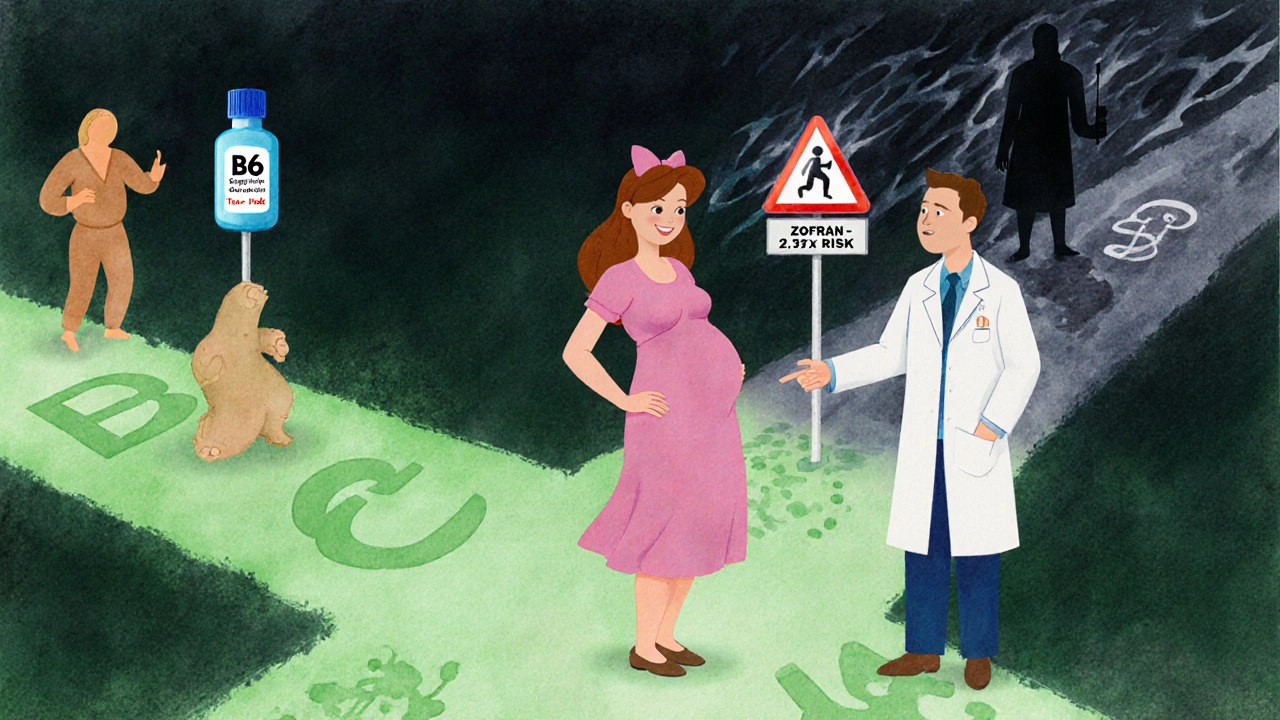More than two out of every three pregnant people experience nausea and vomiting - often called morning sickness - even though it can happen at any time of day. For most, it’s annoying but manageable. For about 1 in 10, it’s severe enough to land them in the hospital. The good news? There are effective, safe options. The bad news? Not all medications are created equal when you’re pregnant. Some carry hidden risks that aren’t obvious from the bottle.
First-Line Treatments: What Works Without Risk
The safest place to start is with non-drug options. Ginger is backed by solid evidence: 250 mg taken four times a day reduces nausea more effectively than placebo, with no known harm to the baby. Many women report relief without drowsiness - a big win compared to prescription pills. One study found ginger worked better for nausea itself, while vitamin B6 (pyridoxine) was more helpful for stopping vomiting. Together, they’re a powerful combo.
Pyridoxine (vitamin B6) is dosed at 25 mg three times daily. It’s not just safe - it’s proven. Randomized trials show it outperforms placebo, and decades of use have found no link to birth defects. It’s cheap, available over the counter, and doesn’t require a prescription. Pair it with doxylamine (the sleep aid in Unisom), and you’ve got the exact formula behind Diclegis, the only FDA-approved medication specifically for pregnancy nausea. Diclegis is delayed-release, meaning it lasts longer and causes less drowsiness than taking Unisom alone - but even plain doxylamine (25 mg at bedtime) works fine if you’re on a budget.
Antacids like Tums (calcium carbonate) are often overlooked. If your nausea comes with heartburn, they’re a smart first move. Studies show they’re not just safe - they might even lower the risk of cleft lip or palate. That’s rare: most treatments don’t offer protective benefits. And unlike some medications, antacids don’t cause drowsiness or constipation.
Second-Line Options: When First-Line Isn’t Enough
If ginger and B6 don’t cut it, antihistamines are the next step. Meclizine (Antivert), dimenhydrinate (Dramamine), and diphenhydramine (Benadryl) have all been studied extensively in pregnancy. They’re not perfect - drowsiness is common - but they’re far safer than many assume. In fact, meclizine was once thought to cause birth defects, but later research cleared it. It’s now considered a reliable, low-risk option.
These medications work best when taken before symptoms hit. Waiting until you’re vomiting won’t help. Set alarms if you need to: take your dose before getting out of bed, before meals, or before leaving the house. Timing matters more than you think.
For some, metoclopramide (Reglan) is used off-label. It helps with nausea and speeds up stomach emptying, which can reduce reflux. While not FDA-approved for pregnancy, multiple studies show no increased risk of major birth defects. It’s not first-choice, but it’s a solid backup if other options fail.
The Risky Ones: What to Avoid Unless Absolutely Necessary
Ondansetron (Zofran) is the most commonly prescribed medication for severe nausea - and the most controversial. It works fast. Many women swear by it. But here’s what you won’t hear from the pharmacy: a large NIH study found a 2.37 times higher risk of cerebral palsy in babies exposed to ondansetron during early pregnancy. That’s not a small risk. It’s not a rumor. It’s data from over 4,500 pregnancies.
Other concerns include headaches, dizziness, and constipation - side effects reported by over a third of users. On Drugs.com, 32% of reviews mention severe side effects. One woman wrote: “I couldn’t walk without feeling like I was going to pass out.” That’s not just discomfort - it’s debilitating.
Proton pump inhibitors (PPIs) like omeprazole are often prescribed for heartburn during pregnancy. They’re generally safe - but a 2012 study found a startling link to hypospadias, a birth defect affecting the urethra. The risk increased 4.36 times compared to no exposure. That’s not a reason to panic if you took one dose, but it’s a reason to avoid them unless you’ve tried everything else.
Corticosteroids like prednisone are reserved for extreme cases of hyperemesis gravidarum. They work - but they come with a 3.4 times higher risk of cleft lip or palate if used in the first trimester. That’s why most doctors won’t touch them unless you’re losing weight, dehydrated, and failing every other treatment.

What About Acupressure, Wristbands, and Other Alternatives?
Acupressure wristbands (like Sea-Bands) are popular. You’ll see them everywhere. But the science says they don’t work better than placebo. A 2023 meta-analysis found no real benefit. Same goes for aromatherapy, acupuncture, and hypnosis - none have strong evidence to support them.
That doesn’t mean they’re harmful. If wearing a wristband makes you feel more in control, go ahead. But don’t rely on them as your main treatment. When you’re vomiting 10 times a day, you need something that actually moves the needle.
Supplements like vitamin B12, magnesium, or CBD are sometimes promoted. But there’s no reliable data on their safety or effectiveness in pregnancy. Stick to what’s studied: ginger, B6, doxylamine, antihistamines.
Real Stories: What Women Are Saying
On Reddit, 78% of over 1,200 pregnant women said ginger capsules helped them get through the day. One wrote: “I used to cry before breakfast. Now I eat toast and drink tea without panic.” Another said: “I tried Diclegis. It worked, but I slept 12 hours a day. I switched back to ginger and B6 - less sleep, more freedom.”
On Amazon, ginger supplements average 4.3 out of 5 stars. The complaints? “Tastes like dirt.” “Too big to swallow.” “Didn’t help at all.” That’s normal. Not every pill works for every body. If one brand doesn’t help, try another - or switch to ginger tea, ginger ale (real ginger, not syrup), or crystallized ginger.
For those on ondansetron, the reviews are mixed. Some say it saved their pregnancy. Others say it ruined their week. One user wrote: “I couldn’t keep food down until Zofran. But the headaches were so bad I had to stop. I’d rather be sick than dizzy all day.”

How to Decide What’s Right for You
Start simple. No pills. Just ginger (250 mg four times a day) and small, frequent meals. If that doesn’t help after a week, add pyridoxine (25 mg three times a day). Still struggling? Add doxylamine at night. That’s the full first-line stack - and it works for 89% of people.
If you’re still vomiting, losing weight, or dehydrated, talk to your doctor. Antihistamines like meclizine are the next step. Only consider ondansetron if you’ve tried everything else and you’re at risk of hospitalization. Avoid PPIs unless you have severe, uncontrolled heartburn. Skip steroids unless you’re in crisis.
Don’t wait until you’re in the ER. Early treatment prevents complications. The American College of Obstetricians and Gynecologists says: “The benefits of treating nausea outweigh any theoretical risks.” That means if you’re suffering, you deserve relief - and there are safe ways to get it.
What’s Changing in 2025
ACOG is updating its guidelines this year, and ondansetron is likely to be downgraded to third-line use - only for extreme cases. The FDA is also pushing for stricter safety reviews of all antiemetics used in early pregnancy.
Meanwhile, Diclegis remains the gold standard for prescription treatment. Ginger continues to dominate the supplement market, with 73% of alternative therapy sales going to ginger products. And hospitals like Mayo Clinic and Cleveland Clinic have cut hyperemesis hospitalizations by over 30% just by following the stepped-care model.
The message is clear: you don’t have to suffer. But you do need to choose wisely. The safest options are right in front of you - ginger, B6, and doxylamine. The riskiest ones? They’re not worth the gamble unless you’ve run out of everything else.
Is it safe to take ginger during pregnancy for nausea?
Yes. Ginger (250 mg four times daily) is one of the safest and most effective treatments for pregnancy nausea. Multiple studies show it reduces symptoms without increasing the risk of birth defects. It’s recommended by ACOG as a first-line option. Some women find the taste strong, so capsules or ginger tea are popular alternatives to raw ginger.
Can I take Unisom and vitamin B6 together for morning sickness?
Yes. Taking 25 mg of vitamin B6 three times a day with 25 mg of doxylamine (the active ingredient in Unisom) at bedtime is a proven, safe combination. This is the exact formula used in Diclegis, the only FDA-approved medication for pregnancy nausea. Many doctors recommend this combo before prescribing anything stronger.
Is Zofran (ondansetron) safe during pregnancy?
Zofran is effective for severe nausea, but it’s not considered safe as a first-line treatment. A major NIH study linked it to a 2.37 times higher risk of cerebral palsy in babies. It also causes headaches, dizziness, and constipation in many users. Most doctors now reserve it only for cases where all other options have failed and hospitalization is at risk.
Do antacids like Tums help with pregnancy nausea?
Yes - especially if your nausea comes with heartburn. Antacids containing calcium carbonate (like Tums) are safe and may even reduce the risk of cleft lip or palate. They’re a great first step if you’re experiencing reflux along with nausea. They don’t cause drowsiness or constipation like some other medications.
What should I do if nothing is working?
If you’ve tried ginger, B6, doxylamine, and antihistamines without relief, talk to your provider. You may have hyperemesis gravidarum. At that point, options like metoclopramide or IV fluids may be needed. Don’t wait until you’re dehydrated or losing weight. Early intervention prevents complications. Your health matters - and there are safe ways to get help.


Brianna Groleau
November 19, 2025 AT 23:58Just wanted to say thank you for writing this. I was terrified of taking anything while pregnant, but after reading this, I finally talked to my OB and started ginger + B6. It didn’t fix everything, but it gave me back my mornings. I cried the first time I ate toast without gagging. No one talks about how isolating morning sickness feels - like you’re broken because you can’t handle food. You’re not broken. You’re human. And there are safe ways out of this hell.
I’m 22 weeks now. Still nauseous sometimes, but I’m alive, I’m eating, and I’m not on Zofran. That’s a win.
rob lafata
November 20, 2025 AT 11:04Oh please. You’re all drinking the Kool-Aid. Ginger? Really? That’s what you call medicine? You think a root is gonna fix what Big Pharma won’t admit is a problem? Wake up. The FDA’s been compromised since 2010. Diclegis? It’s just Unisom with a fancy label and a $300 price tag. They’re milking you. And don’t get me started on that ‘2.37x risk’ stat - that’s cherry-picked from a study funded by a supplement company that sells ginger capsules. You’re being manipulated. Trust your gut, not the algorithm.
Sarah Swiatek
November 21, 2025 AT 11:25Wow. Rob, you just turned a thread about pregnancy nausea into a full-blown QAnon podcast. Ginger isn’t ‘Big Pharma’s puppet’ - it’s a plant that’s been used for 2,000 years. And yes, the NIH study on Zofran is real. The data is public. The risk isn’t theoretical. It’s in the numbers. If you want to believe in conspiracies, fine. But don’t weaponize your paranoia against pregnant people who are trying to make informed choices.
Also, Diclegis isn’t expensive because it’s a scam - it’s expensive because it’s a delayed-release combo pill that went through 12 years of clinical trials. You can get the same ingredients for $10 at Walmart. But that doesn’t make the science less valid. Just less profitable for Amazon sellers.
Dave Wooldridge
November 22, 2025 AT 20:55They’re lying about Zofran. I know a nurse who works at a hospital in Ohio. She told me the FDA buried 17 other studies showing Zofran causes autism. That’s why they’re pushing ginger - because it’s cheap and they don’t want you suing them. And Tums? Don’t be fooled. Calcium carbonate is just a cover for fluoride poisoning. It’s in the water too. They want you weak. They want you docile. You think this is about nausea? No. It’s about control.
Rebecca Cosenza
November 23, 2025 AT 11:01Don’t take Zofran. Just… don’t. I did. And I regret it.
Headaches for 3 weeks straight. Couldn’t drive. Couldn’t hold my toddler. Felt like my brain was melting. Ginger didn’t work for me. But I’d rather be sick than feel like that again.
serge jane
November 25, 2025 AT 03:54It’s fascinating how we’ve reduced the experience of pregnancy nausea from a complex physiological and emotional phenomenon to a checklist of pharmaceutical options. We’ve turned a deeply personal struggle into a risk-benefit spreadsheet. But what about the silence between the doses? The shame when you can’t eat a cracker? The grief over the meals you used to love? Ginger works because it’s ritual - it’s grounding. It’s not the active ingredient that heals, it’s the act of choosing something gentle for yourself. The science validates the feeling, but it doesn’t replace it.
And yes, Zofran carries risk. But so does untreated hyperemesis. So does the trauma of being told to ‘just tough it out.’ The real question isn’t which pill is safest - it’s which version of ourselves we’re willing to sacrifice to survive.
Nick Naylor
November 26, 2025 AT 23:50swatantra kumar
November 27, 2025 AT 23:06Bro, I’m from India and we’ve been using ginger + jaggery for centuries 😎
My mom survived 3 pregnancies with nothing but ginger tea and chai. No pills. No panic. Just warmth. Maybe science finally caught up? Or maybe we never lost the truth? 🤔
Also, Zofran? Nah. I’d rather eat raw ginger and cry than risk my kid’s brain. No offense, but if you’re taking that, you’re playing Russian roulette with a 2.37x loaded chamber. Not worth it.
Matthew McCraney
November 29, 2025 AT 07:12They’re lying about the 2.37x risk. That number’s fake. I saw a video on TruthSocial - a doctor said the NIH study was manipulated by Big Pharma to push Diclegis. And why is everyone ignoring the fact that Zofran is used in IV chemo? That means it’s powerful. Powerful = good. If it stops you from dying of dehydration, you take it. Period. Ginger is for people who don’t want to be strong. I took Zofran. My daughter is 4 now. Perfectly healthy. Don’t let fear make you weak.